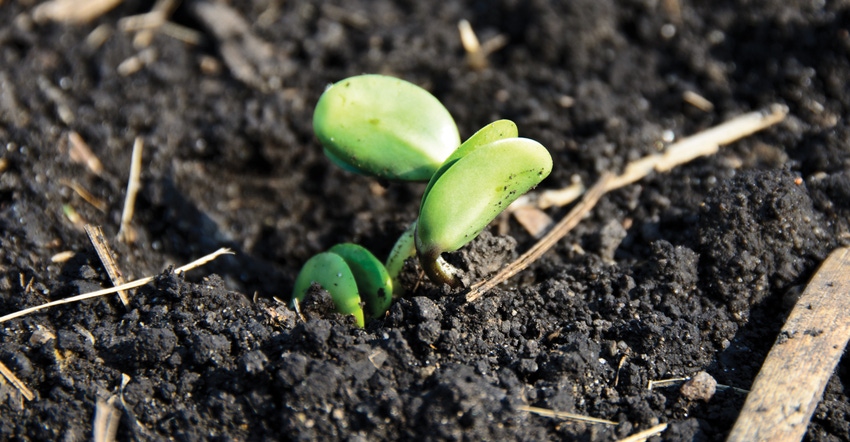
Improving seed protection is what makes or breaks a farmer’s ability to achieve high soybean yields, Justin Clark says. And he says “fresh rhizobia” is the key.
Clark, a technical field lead for seed treatments at BASF, says Vault IP Plus seed treatment is a new inoculant and biological fungicide product that offers more viable nitrogen-fixing rhizobia at a lower use rate. The result is more return on investment for soybean growers.
Importance of fresh
Active rhizobia bacteria create healthy nodules on the soybean plant and allow for better nitrogen fixation, Clark explains during the recent virtual Commodity Classic.
“What we know about rhizobia is that it is in the atmosphere in general, and that 78% of the air we breathe in every day is made up of nitrogen, but it's not in a usable form for plants,” he says. “Rhizobia in a relationship with the plant root, captures that atmospheric nitrogen that the plant can utilize, and stores it and converts it into a usable form for that plant.”
Clark says it is important that farmers do not rely on “native” rhizobia that already exist in nature, but they use fresh live rhizobia on their crop every year.
It takes about 5 pounds of nitrogen to produce 1 bushel of soybeans. Clark says the relationship between the bacteria and the soybean root account for 60% of the nitrogen requirement of the crop. “So, it is important to have lots of fresh rhizobia on that seed and in that seed zone for the success of a soybean crop," he says.
Product breakdown
BASF takes a three-dimensional approach to its new product.
First, the rhizobia inoculant found in Vault IP Plus is a Bradyrhizobium japonicum, which allows the soybean plant to fix its own nitrogen. Second, the biological fungicides provide for extended disease protection, along with greater uptake in nutrients and water. Third, farmers use a lower rate of the product and have more space on the seed for other treatments.
The rhizobial strain is produced fresh at a plant in St. Joseph, Mo. In general, rhizobia are more challenging to keep alive and viable both in the pack during storage, and also on the seed post application, says Piran Cargeeg, BASF R&D global and U.S. seed treatment lead.
“BASF implements rigorous and multi-point [quality control] procedures for all of our products, and inoculants are no exception,” he says. The quality control team checks for freedom from contamination and the number of viable rhizobia. The company guarantees a fresh, high rhizobial count of at least 10 billion cells per milliliter at labeled expiration.
When it comes to the biological fungicides portion of the seed treatment, Paul Klemme, BASF product manager for inoculants and biologicals, says the two EPA-registered biofungicides control rhizoctonia and fusarium and help with water and nutrient uptake. “You get two biological fungicides with multiple modes of action for disease control.”
He says with this increased level of protection, Vault IP Plus offers even more benefits to drive higher yields.
Results are in
Cargeeg says Vault IP Plus has one of the lowest applications rates in its class. At 0.51 fluid ounces per 140,000 seeds, or 1.1 ounce per cwt., it offers more opportunity on the seed itself.
“The low use rate allows you to put more products on that soybean seed,” he explains. “If you’re looking to add a nematicide or a fungicide or even an insecticide, you’ve got more space to be able to do that.” And protecting the seed can equate to more soybeans in the bin.
In BASF yield trials, Klemme found a 2-bushel yield response with the product. “What this means for you is maximum yield potential and a great return on investment,” he says. “At $13 or $14 per bushel soybeans, you’re getting about a 4-to-1 return on that investment.”
BASF Vault IP Plus seed treatment is available this year.
About the Author(s)
You May Also Like






